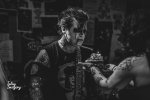Fat Freddy's Drop - Dr Boondigga and the Big BW
11 Jun 2009 // A review by lukefitzmaurice
 I fell in love with this album about five and a half minutes into track six. Up until that point I was reasonably impressed with the album, but I felt like Fat Freddy’s Drop hadn’t quite captured the vibe that made their first album so immensely successful. Then came track six, The Camel. It starts out fairly low-key, as does most of the album, slowly building up and dying away again as the track progresses. Then, on about the five minute mark, everything cuts back, first to a short café-jazz style instrumental, then to nothing but a guitar and the vocals of front man Joe Dukie. Then, slowly still, in comes the trumpet, then the keys, then the drums, and all of a sudden, there it is. The Fat Freddy’s magic is back.
I fell in love with this album about five and a half minutes into track six. Up until that point I was reasonably impressed with the album, but I felt like Fat Freddy’s Drop hadn’t quite captured the vibe that made their first album so immensely successful. Then came track six, The Camel. It starts out fairly low-key, as does most of the album, slowly building up and dying away again as the track progresses. Then, on about the five minute mark, everything cuts back, first to a short café-jazz style instrumental, then to nothing but a guitar and the vocals of front man Joe Dukie. Then, slowly still, in comes the trumpet, then the keys, then the drums, and all of a sudden, there it is. The Fat Freddy’s magic is back.
The obvious first thing that I noticed about Fat Freddy’s Drops sophomore album is the fact that it is very, very long. Its 70 minute running time is made all the more remarkable by the fact that it contains only 9 tracks. Pull The Catch, track 5 on the album, is the shortest of all the songs, but even that runs for an impressive 5:18. However, despite their length, at no point did I feel like any song was dragging on for too long, as most of them just develop into extended jam sessions, much like their live sets also tend to do.
As for the album as whole, in my opinion it is even better than their debut, Based On A True Story, purely because of the enormous array of genres it spans. In Shiverman, the band produces a track that wouldn’t go amiss a crowd of thousands at a summer festival, while in the very next song, Boondigga, we hear a sound that wouldn’t be out of place played in a café to only a handful of people. Even within tracks we hear the sound evolve from genre to genre, in The Nod for example, which begins with a harmonica-driven blues riff before launching into big-band jazz, later dabbling in hip-hop, but holding the same beat right the way through. There’s that classic dub sound in The Raft and Wild Wind, soul in The Camel, and elements of funk littered right the way through the record. The way the band manages to pull together so many different styles of music is quite remarkable.
In general, the album seems slightly more upbeat than Based On A True Story. There are no really slow soulful songs like there were on that album in the form of Del Fuego and Hope. Personally, Hope was one of my favourites on that album, but the absence of any slower songs of the same vein does not seem to detract from Dr Boondigga And The Big BW. The fact that Fat Freddy’s Drop have spent two years perfecting this album is anything but surprising. There is not a single track which lets the others down, and at no point does the album sound strained or forced. It would not surprise me if this album spends even longer on the charts than their first one did, as it is simply sublime.
 I fell in love with this album about five and a half minutes into track six. Up until that point I was reasonably impressed with the album, but I felt like Fat Freddy’s Drop hadn’t quite captured the vibe that made their first album so immensely successful. Then came track six, The Camel. It starts out fairly low-key, as does most of the album, slowly building up and dying away again as the track progresses. Then, on about the five minute mark, everything cuts back, first to a short café-jazz style instrumental, then to nothing but a guitar and the vocals of front man Joe Dukie. Then, slowly still, in comes the trumpet, then the keys, then the drums, and all of a sudden, there it is. The Fat Freddy’s magic is back.
I fell in love with this album about five and a half minutes into track six. Up until that point I was reasonably impressed with the album, but I felt like Fat Freddy’s Drop hadn’t quite captured the vibe that made their first album so immensely successful. Then came track six, The Camel. It starts out fairly low-key, as does most of the album, slowly building up and dying away again as the track progresses. Then, on about the five minute mark, everything cuts back, first to a short café-jazz style instrumental, then to nothing but a guitar and the vocals of front man Joe Dukie. Then, slowly still, in comes the trumpet, then the keys, then the drums, and all of a sudden, there it is. The Fat Freddy’s magic is back.The obvious first thing that I noticed about Fat Freddy’s Drops sophomore album is the fact that it is very, very long. Its 70 minute running time is made all the more remarkable by the fact that it contains only 9 tracks. Pull The Catch, track 5 on the album, is the shortest of all the songs, but even that runs for an impressive 5:18. However, despite their length, at no point did I feel like any song was dragging on for too long, as most of them just develop into extended jam sessions, much like their live sets also tend to do.
As for the album as whole, in my opinion it is even better than their debut, Based On A True Story, purely because of the enormous array of genres it spans. In Shiverman, the band produces a track that wouldn’t go amiss a crowd of thousands at a summer festival, while in the very next song, Boondigga, we hear a sound that wouldn’t be out of place played in a café to only a handful of people. Even within tracks we hear the sound evolve from genre to genre, in The Nod for example, which begins with a harmonica-driven blues riff before launching into big-band jazz, later dabbling in hip-hop, but holding the same beat right the way through. There’s that classic dub sound in The Raft and Wild Wind, soul in The Camel, and elements of funk littered right the way through the record. The way the band manages to pull together so many different styles of music is quite remarkable.
In general, the album seems slightly more upbeat than Based On A True Story. There are no really slow soulful songs like there were on that album in the form of Del Fuego and Hope. Personally, Hope was one of my favourites on that album, but the absence of any slower songs of the same vein does not seem to detract from Dr Boondigga And The Big BW. The fact that Fat Freddy’s Drop have spent two years perfecting this album is anything but surprising. There is not a single track which lets the others down, and at no point does the album sound strained or forced. It would not surprise me if this album spends even longer on the charts than their first one did, as it is simply sublime.
Dr Boondigga And The Big BW
View Track Listing
View Track Listing
About Fat Freddy's Drop

These influences have not only been formed by the band’s individual predilections, but also experiences on the road: Fat Freddy’s appearance at Detroit’s Movement festival in 2006 was a watershed moment for the band, fuelled by hearing May’s, Atkin’s and Craig’s stark futurism ricochet off the cold concrete of America’s broken dream. This stoked producer DJ Mu’s love of analog techno, balancing and fusing vocalist Dallas Tamaira’s adoration of soul and reggae with the band’s collective passion for Jazz, Rhythm & Blues, Rock, Disco, House, Post Punk and Balearic oddities.
For Bays studio album released in 2015, the 9-track LP was exclusively written and recorded at their studio in Kilbirnie, Wellington. Pre-Bays, Freddy's albums were formed almost entirely on the road; the songs slowly evolving live at festivals such as WOMAD UK, SONAR, Bestival, Lowlands, DEMF, Pukkelpop, Glastonbury, The Big Chill and Roskilde.
Visit the muzic.net.nz Profile for Fat Freddy's Drop
Releases
Other Reviews By lukefitzmaurice
 Urbantramper - Urban Tramper - 'Rise & Ride Toward' album review
Urbantramper - Urban Tramper - 'Rise & Ride Toward' album review
05 Dec 2009 // by lukefitzmaurice
Ok, I’ll admit, before I listened to this album, I had never really heard of Urban Tramper. Their name rang vague bells in the back of my mind, perhaps I’d heard snippets on the radio or seen a poster in the street somewhere, but if you’d played me one of their older songs I probably wouldn’t have recognised it.
Read More...
 Diesel Phoenix - 'Here's Something We Prepared Earlier' album review
Diesel Phoenix - 'Here's Something We Prepared Earlier' album review
05 Dec 2009 // by lukefitzmaurice
'Here’s Something We Prepared Earlier' is the new album from Auckland five-piece Diesel Phoenix, a hard hitting record which throws together rock, punk, pop, and even a little bit of metal. The album opens with the eerie instrumental track 'Willard’s Run', a song which provides a haunting introduction to the rest of the album.
Read More...
 Eru Dangerspiel - Great News For The Modern Man album review
Eru Dangerspiel - Great News For The Modern Man album review
21 Aug 2009 // by lukefitzmaurice
With any experiment, there are always going to be some things that work out great, and others that don’t really go down so well. Therefore, with any experimental album, the same is bound to happen.
Read More...
 Cairo Knife Fight - Iron album review
Cairo Knife Fight - Iron album review
01 Aug 2009 // by lukefitzmaurice
When I first listened to this album I immediately got the impression of movement. The first track definitely felt like it was driving towards… well… something, I wasn’t quite sure what at that stage.
Read More...
 Good Laika - Followed by a Trail of Sparks review
Good Laika - Followed by a Trail of Sparks review
30 Jul 2009 // by lukefitzmaurice
The press release that came with this album read, “When listening to Good Laika’s sophomore album Followed by a Trail of Sparks, you could be forgiven for thinking you’d stumbled across some lost soul’s travel diary.” It was an interesting introduction to an album, so I sat with eager anticipation as I played it through for the first time.
Read More...
 The Veils - Sun Gangs Reviews
The Veils - Sun Gangs Reviews
07 May 2009 // by lukefitzmaurice
A word of warning – on the whole, Sun Gangs seems pretty slow. And to be fair, it’s true that the album contains one or two tracks that are indisputably subdued, title track Sun Gangs being one that immediately springs to mind.
Read More...
 Sola Rosa - Get It Together review
Sola Rosa - Get It Together review
11 Apr 2009 // by lukefitzmaurice
There is something irresistibly funky about this album, and it hits you within seconds of pressing play. The opening track, The Ace of Space, has a kind of Ocean’s Eleven quality to it, and as I listened to the rest of the album I never really shook the feeling of being engrossed within a Las Vegas casino heist.
Read More...
 The Mint Chicks - Screens Review
The Mint Chicks - Screens Review
31 Mar 2009 // by lukefitzmaurice
First things first, DO NOT judge this album the first time you listen to it. That’s what I was tempted to do, because in all honesty, after listening to Screens once through I was a little disappointed.
Read More...
Most Viewed Artists
Latest Galleries
NZ Top 10 Singles
- APT.
ROSÉ And Bruno Mars - DIE WITH A SMILE
Lady Gaga And Bruno Mars - BIRDS OF A FEATHER
Billie Eilish - TASTE
Sabrina Carpenter - I LOVE YOU, I'M SORRY
Gracie Abrams - ESPRESSO
Sabrina Carpenter - SAILOR SONG
Gigi Perez - LOSE CONTROL
Teddy Swims - A BAR SONG (TIPSY)
Shaboozey - GOOD LUCK, BABE!
Chappell Roan






















 Report A Problem
Report A Problem

